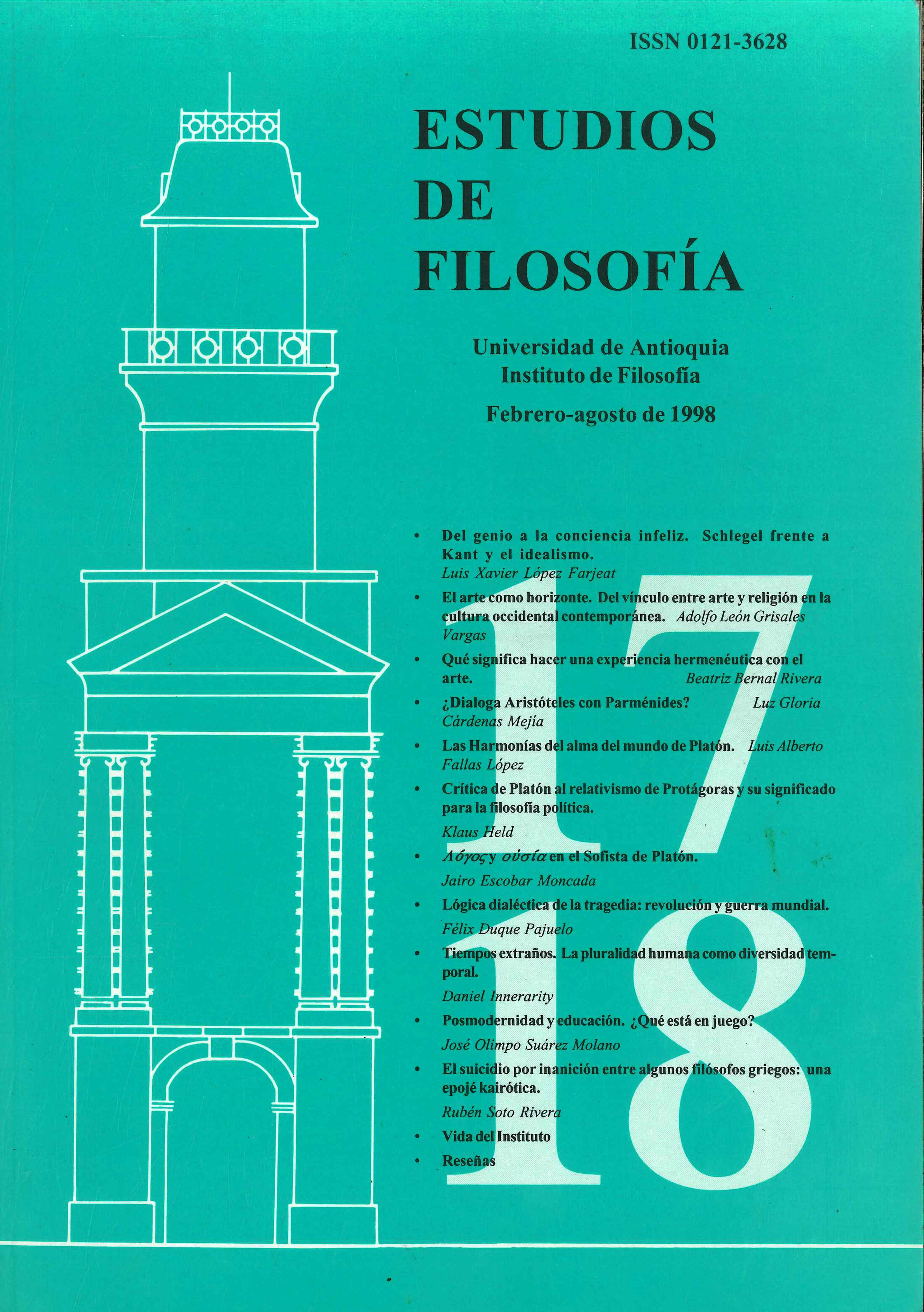Lógos y oúcría en el Sofista de Platón
DOI:
https://doi.org/10.17533/udea.ef.337990Palabras clave:
lógos, oúcría, lenguaje, serResumen
En el ensayo logos y oúcría en el Sofista de Platón se discute la relación entre lenguaje y ser, y el modo como Platón concibe dicha relación. Primero se reconstituye las críticas que platón le hace a las teorías ontológicas anteriores así como la famosa gigantomaquia alrededor del ser. Todas tienen algo en común: desconocen el papel esencial del Lógos en el conocimiento del ser. Luego se discute la función de la imagen en el conocimiento, y qué relación hay entre lenguaje e imagen. Por último se busca dar una interpretación del término lógos, utilizado al final del diálogo, y que se traduce normalmente como frase u oración.
Descargas
Citas
Francisco Bravo, Teoría Platónica de la Definición, Caracas: Universidad Central de Venezuela, 1985.
F. :M.. Comford, Plato's Theory of Knowledge, London: Routledge & Keagan Paul, 1979(1935).
Jairo Escobar Moncada, Chora und Chronos, Lagos und Ananke in der Element en theorie von Platons "Timaios ", Wupperta11995.
Jairo Escobar Moncada, Eikos lógos- kósmos philosophía, en: Estudios de Filosofía N. 13, Medellín: Editorial Universidad deAntioquia, Febrero 1996, pp. 123-139. DOI: https://doi.org/10.17533/udea.ef.338445
Francesco Fronterotta, L'etre et la participation de l'autre. Une nouvelle ontologie daos le Sophiste, en: Les Études Philosophiques, N° 311995, pp. 311-353.
Platonis Opera. Rec. brevique adnotatione critica instr. J. Burnet. 5 Vol. Oxford: 1906-1914.
Platón, Diálogos, Vol. V: Parménides, Teeteto, Sofista. Político, Madrid: Gredas 1992.
Platon, El Sofista. traducción de Antonio Tovar. Madrid: instituto de Estudios Políticos. 1970.
W. K. C. Guthrie: A History of Greek Philosophy. Vol. V: The later Plato and the Academy, Cambridge: 1978. DOI: https://doi.org/10.1017/CBO9780511518430
Wolfgang Wieland, Platon und die Formen des Wissens, Gottingen: Vandenhoeck und Ruprecht, 1982.
Descargas
Publicado
Cómo citar
Número
Sección
Categorías
Licencia
Derechos de autor 1998 Jairo Escobar Moncada

Esta obra está bajo una licencia internacional Creative Commons Atribución-NoComercial-CompartirIgual 4.0.
Los autores que publican en Estudios de Filosofía acuerdan los siguientes términos:
1. El Autor retiene el copyright del "Artículo", por el cual se entiende todos los objetos digitales que pueden resultar de la subsiguiente publicación o distribución electrónica.
2. En conformidad con los términos de este acuerdo, el autor garantizará a Estudios de Filosofía como Editor el derecho de la primera publicación del artículo.
3. El Autor le concederá al Editor un derecho perpetuo y no-exclusivo, así como una licencia de la misma clase, de publicar, archivar y hacer accesible el Artículo parcial o totalmente en todos los medios conocidos o por conocerse, derecho y licencia que se conocen como Creative Commons License Deed. Atribución-No Comercial- Compartir igual CC BY-NC-SA o su equivalente que para efectos de eliminar toda duda, le permite a otros copiar, distribuir, y transmitir el Artículo bajo las siguientes condiciones: (a) Atribución: Se deben reconocer los créditos de la obra de la manera especificada por el Autor a Estudios de Filosofía, pero no de una manera que sugiera que tiene su apoyo o que apoyan el uso que hace de su obra. (b) No Comercial: No se puede utilizar el Artículo para fines comerciales.
4. El Autor puede realizar otros acuerdos contractuales no comerciales para la distribución no exclusiva de la versión publicada del Artículo (v. gr. ponerlo en un repositorio institucional o publicarlo en un libro) con la condición de que haga el debido reconocimiento de su publicación original en Estudios de Filosofía.
5. A los Autores se les permite y Estudios de Filosofía promueve publicar en línea (online) la versión pre-impresa del Artículo en repositorios institucionales o en sus páginas web, antes y durante la publicación, por cuanto que puede producir intercambios académicos productivos, así como una mayor citación del Artículo publicado (ver The Effect of Open Access). Dicha publicación durante el proceso de producción y en la publicación del Artículo se espera que se actualice al momento de salir la versión final, incluyendo una referencia a la URL de Estudios de Filosofía.















